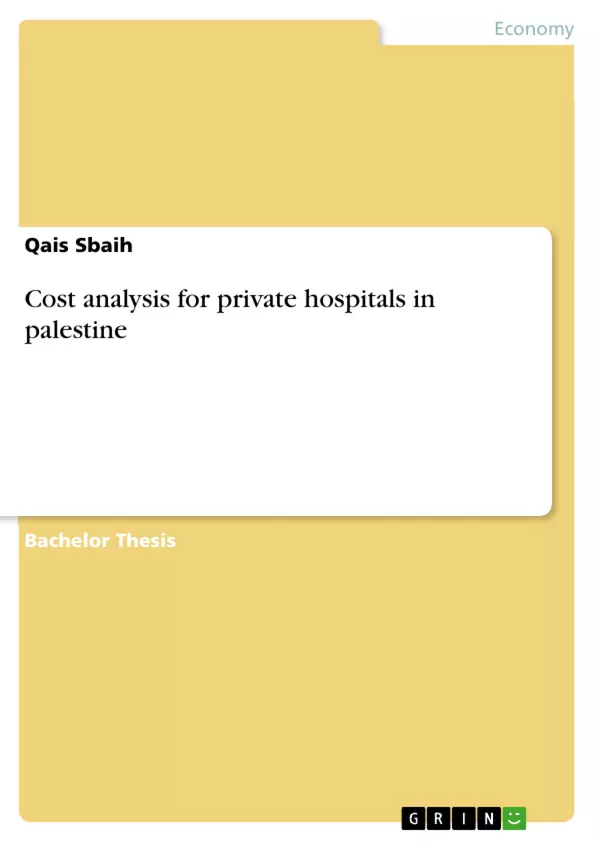Using the Volume Based Costing (VBC), which is a traditional costing system in hospitals especially if it used to accounting for surgical wards is not efficient and effective. However, prices for medical surgeries calculated using traditional costing system as VBC will not recover the costs incurred by the hospital for these surgeries, if the hospital uses VBC will suffer deficit because the revenues, represented by charged prices, collected for specific medical services will not recover the costs incurred. The reason is, however, the VBC is allocates all the costs into one cost driver, this would give all costs objects unfair share of incurred costs not according to real usage of these costs.
To solve that problem, and to set fair prices for patients and hospitals, a hospital should use an advanced costing system as Activity Based Costing (ABC), which is uses more than one costs driver and incur costs objects according to usage.
For ArabCare Hospital, Palestine, the prices currently charged which is supposed to be calculated by used ABC is more accurate and fair for both the hospital and patients. However, if the hospital used the volume based costing (VBC) will not recover its costs and expenses. Then, prices charged currently in the operation prices code of ArabCare hospital is able to recover costs but it is needed to be updated periodically because the changes of market prices of medical supplies.
Inhaltsverzeichnis (Table of Contents)
- Acknowledgment
- Table of Contents
- Abstract
- 1. Introduction
- 2. Background
- 3. General Framework
- 3.1 Research Problem
- 3.2 Study objectives
- 3.3 Research Importance
- 3.4 Methodology
- 3.4.1 Study type
- 3.4.2 Study community and sample
- 3.4.3 Data source and collection
- 3.4.4 Procedures
- 3.5 research hypothesis
- 3.6 Keywords Definitions
- 4. Literature Review
- 4.1 Foreign Studies
- 4.2 Arab and Palestinian Studies
- 4.3 What Distinguishing this Study of Others:
- 5. Hospitals and Costing Systems
- 5.1 Cost Accounting:
- 5.2 Traditional Costing System
- 6. Implementing of VBC on ArabCare Hospital, Palestine.
- 7. References
- 8. Annexes
- 8.1 Annex 1; Partial Income Statement of ArabCare Hospitals for 2012
- 8.2 Annex 2; Number of patients entered the hospitals Wards during 2012
- 8.3 Annex 3; Code of Hospital Prices of all Wards- all Operations
Zielsetzung und Themenschwerpunkte (Objectives and Key Themes)
The study aims to examine the cost accounting system of a private hospital in Palestine and determine whether the pricing of medical services is fair for both patients and the hospital. This research is conducted on ArabCare Hospital and focuses on the surgical ward. It seeks to establish the effectiveness of traditional costing methods, such as Volume Based Costing (VBC), in healthcare settings, particularly in comparison to more advanced systems like Activity Based Costing (ABC).
- Cost accounting in private Palestinian hospitals
- Effectiveness of traditional costing systems in healthcare
- Fairness of pricing for medical services
- Comparison of VBC and ABC costing systems
- Impact of cost allocation on pricing decisions
Zusammenfassung der Kapitel (Chapter Summaries)
The first chapter introduces the research and discusses the need for cost analysis in Palestinian private hospitals. Chapter 2 provides background information about ArabCare Hospital. Chapter 3 outlines the research problem, objectives, importance, methodology, hypothesis, and key definitions. Chapter 4 delves into the literature review, analyzing relevant foreign and Palestinian studies. Chapter 5 explores the concepts of cost accounting and traditional costing systems. Finally, Chapter 6 examines the implementation of VBC at ArabCare Hospital, presents research results, and offers recommendations.
Schlüsselwörter (Keywords)
This research focuses on cost analysis, private hospitals, Palestine, Volume Based Costing (VBC), Activity Based Costing (ABC), pricing of medical services, fairness, efficiency, and effectiveness.
Frequently Asked Questions
What is Volume Based Costing (VBC) in hospitals?
VBC is a traditional costing method that allocates all indirect costs based on a single volume-related driver, such as the number of patients or bed days.
Why is VBC considered inefficient for surgical wards?
VBC fails to account for the actual resources consumed by different types of surgeries. This often leads to underpricing of complex procedures, causing financial deficits for the hospital.
What is Activity Based Costing (ABC)?
ABC is an advanced costing system that uses multiple cost drivers to assign costs to specific activities and services based on their actual consumption of resources, leading to fairer pricing.
Is medical pricing at ArabCare Hospital fair for patients?
The study suggests that pricing based on ABC is more accurate and fair for both the hospital and the patients, as it reflects the real usage of medical supplies and services.
Why do medical prices need to be updated periodically?
Costs must be updated due to constant fluctuations in the market prices of medical supplies and equipment, ensuring the hospital can recover its expenses.
- Quote paper
- Qais Sbaih (Author), 2013, Cost analysis for private hospitals in palestine, Munich, GRIN Verlag, https://www.grin.com/document/269403



